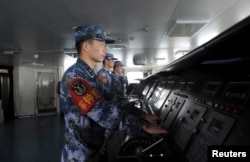The Taiwanese government is one of several that claims territory in the hotly contested South China Sea, but Taipei has long been sidelined in the dispute, overshadowed by China. Now, as the Philippines challenges Beijing’s claims in an international court at The Hague, Taipei is looking to publicly assert its claims.
Revisiting history
One way it is doing that is by revisiting history, publicizing photos - mostly maps, government papers and media reports - and talking about diplomatic negotiations and patrols that its navy has carried out in the past.
As a young naval officer, Miao Yung-ching took part in a patrol for Taiwan to the Spratlys. The near month-long mission made several stops, including one at Itu Aba, known in Taiwan as Taiping Tao or Peace Island.
“Two years after I graduated in the 55th year of the Republic of China (1966) I was a first lieutenant on the Taihe warship. Our mission was to repair sovereignty monuments on the islands, which we had heard the Philippines had destroyed,” said Miao, now a retired admiral and former commander-in-chief of Taiwan’s navy.
Taiwan took control of Itu Aba in 1956, the largest natural feature in the Spratly Islands. And now, the islet is a centerpiece of Taipei’s claims in the contentious waters with an airstrip, military and weather installations, and solar panels for energy. Unlike artificial islands built up by Beijing, the islet has not been enlarged through massive land reclamation efforts.
Miao said that on the mission he took, there were no skirmishes with other claimants. But much like then, he said, it is still important that Taiwan continue to assert its claims.
“Any country would stand 100 percent firm in asserting its territorial claims and we have plenty of historical proof,” Miao said.
Rock and hard place
But how Taiwan can do that has always been complicated. China considers the democratically-ruled island part of its territory that must be rejoined with the mainland.
And while Taipei has long taken a low-key approach in the South China Sea, it shares the same claims as China – a U-shaped line on its maps that asserts that almost all of the busy waterway is part of its territory.
China calls it a nine-dash line and Taiwan the 11-dash line. China’s nine-dash line is a key claim that Manila is challenging and a source of frustration for other claimants.
The line was drawn up when the Nationalists were still in power in China in 1947. Before Mao Zedong’s communists defeated them and the Nationalists fled to Taiwan.
“Taiwan in the past has been between a rock and a hard place because to the extent that it asserted its claims, it was kind of supporting the Chinese view,” said William Stanton, a former U.S. diplomat and senior vice president of Taiwan’s National Tsing Hua University.
“It didn’t particularly want to get crosswise of the U.S. [as well] because it (Washington) has not been enamored by the nine-dash line or 11-dash line because it thinks it has to be based on international law, not lines people draw on a map, but land features,” said Stanton.
As the Philippines and China continue to debate their claims under international law, President Ma Ying-jeou may visit Itu Aba sometime in December to re-assert Taipei’s claims and inaugurate the establishment of a new port.
What Ma may say while there is uncertain, but the arbitration ruling will be a key one for Taiwan to watch because Taipei shares the same claims as China. But unlike Beijing, Taipei is more likely to abide by the ruling, suggested Stanton.
“And since Taiwan would like to adhere more closely to international law, even though it is not a member of the U.N. it generally abides by U.N. decisions. It will put Taiwan in a very difficult position.”
Election issue
Earlier this year, Ma Ying-jeou proposed a peace initiative for the South China Sea that aimed to put aside claims of sovereignty and focus on joint development of resources. The plan was based on an earlier proposal Taiwan used in the East China Sea to set aside disputed claims with Japan that allowed it to jointly fish in contested waters.
However, since the decision from the Permanent Court of Arbitration will not come until sometime next year, the challenge of addressing the issue may be more of a matter for the island’s next leader to resolve.
Taipei holds Presidential elections in January and it is already a topic.
Opposition candidate Tsai Ing-wen is a hopeful in the race, and has proposed holding dialogue with the other claimants, including China. But how much she could do, if elected, to address the issue is unclear.
Some have suggested that Tsai reject the nine or 11-dash line all together. Others say Taipei should be realistic and just focus on the islets that are already under its control.
Professor Wang Kun-yi of the Taiwan Strategy Research Center said it would be difficult for Tsai to both assert claims in the South China Sea and promote her go-south policy, which aims to increase ties with Southeast Asian countries.
“Advocating sovereignty in the South China Sea is really more of a matter for China to deal with,” Wang said. “Taiwan should recognize that it is a small country and does not have the strength to deal with the issue.”
Stanton said that if Tsai is elected “there’s going to be a broad reconsideration of Taiwan policies across the board,” but the economy, unemployment and relations with China are likely to take precedence.













